Record Reviews
3 Reviews Found. Use search to find more reviews or follow the links in the review text.
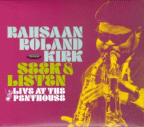 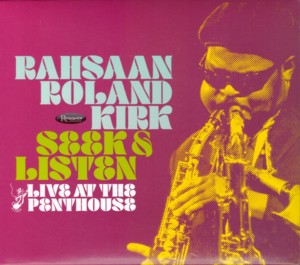 | RAHSAAN ROLAND KIRK ~ SEEK & LISTEN: LIVE AT THE PENTHOUSE
RESONANCE 2080 (Barcode: 617270122976) ~ USA ~ Jazz
Recorded: 1967 Released: 2025
This is an archival 2CD live album by the unique American multi-instrumentalist / composer Rahsaan Roland KirkFind albums by this artist, recorded at the legendary Seattle Penthouse Jazz club, on September 8, 1967 (CD1 five tracks) and September 15, 1967 (CD2 six tracks). Most of the music was composed by Kirk and four tracks are arrangements of standards. The album features a quartet lineup, with Kirk, pianist Rahn BurtonFind albums by this artist, bassist Steve NovoselFind albums by this artist and drummer Jimmy HoppsFind albums by this artist. As usual with the albums released by Resonance Records, the album includes a 36-pages informative booklet with in-depth articles and excellent photographs. The restored sound this time is only acceptable, but barely so.
The album is a perfect example of Kirk’s virtuosity as an instrumentalist and originality as an improviser, but the music is pretty straightforward mainstream American Jazz, which does not innovate or surprise anyone, surely not in retrospect. It showcases Kirk playing many different instruments and even singing, but anybody familiar with his recordings won’t find here anything not heard previously.
In retrospect, this music does sound quite predicable and shackled within the mainstream conventionalism, especially in contrast to Jazz Avant-Gardist, who were already exploring the uncharted territories. This album was recorded just two months following the death of John ColtraneFind albums by this artist, which marked the end of American Jazz dominance and the leadership of the Jazz idiom.
Overall, this is an interesting piece of American Jazz history and a tribute to the figure of one of its most unusual heroes, which of course is always a welcome addition to the recorded Jazz collection, but basically offers little innovation or truly memorable moments.
| | Updated: 19/01/2026Posted: 19/01/2026 | CD 2 Digipak Remastered Recommend To A Friend |
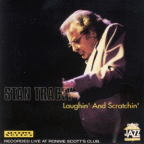 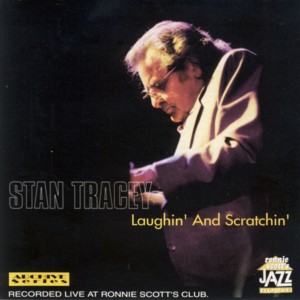 | STAN TRACEY ~ LAUGHIN` AND SCRATCHIN`
JAZZ HOUSE 608 (Barcode: 751848670824) ~ UK ~ Jazz
Recorded: 1965 Released: 1997
This is an album which presents archival / informal recordings by the Godfather of modern British Jazz, pianist / composer Stan TraceyFind albums by this artist, recorded live in a trio format at the famous Ronnie Scott´s Club in London, featuring bassist Rick LairdFind albums by this artist (later of Mahavishnu OrchestraFind albums by this artist fame) and drummers Ronnie StephensonFind albums by this artist or Bill EydenFind albums by this artist. The trio performs seven pieces, two of which are originals by Tracey and five are standards.
Between 1959 and 1965 Tracey and his trio served as the house band at the Ronnie Scott´s Club (the original one at Gerrard Street) and accompanied scores of visiting musicians, mostly from the US, such as Johnny GriffinFind albums by this artist, Sonny RollinsFind albums by this artist, Ben WebsterFind albums by this artist, Stan GetzFind albums by this artist, Wes MontgomeryFind albums by this artist, Roland KirkFind albums by this artist and many, many more. Playing with these Giants obviously served as a wonderful opportunity for Tracey to polish his chops, but more importantly to develop his own style as a player and composer, which differed from the standard American Bebop approach.
The selections included on this album are all pretty long in duration and as such are wonderful documents of Tracey´s idiosyncrasies as a piano player, with his quite unique approach to the instrument, similar in some ways to what Thelonious MonkFind albums by this artist was doing. Tracey plays mostly chords, vamping and boogieing all over the keyboard, only occasionally playing out the melody notes. His interpretation of the Monk tune present here is simply amazing.
The rhythm section bravely keeps up with the governor, standing with him shoulder to shoulder even during the unexpected twists and turns he takes along the way. Although the sound quality of this album is far from ideal, the music is absolutely stunning and more than compensates for the technical limitations.
Albums like this are precious pieces of Jazz history captured for eternity, which are still valid today and are definitely worth listening to, especially by the young generation, which missed it in real time. Great stuff!
| | Updated: 24/03/2016Posted: 24/03/2016 | CD 1 Recommend To A Friend |
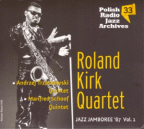 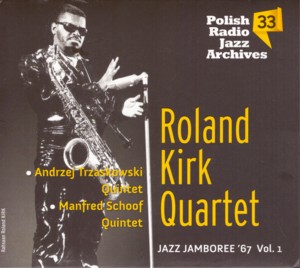 | VARIOUS ARTISTS ~ POLISH RADIO JAZZ ARCHIVES VOL.33
POLSKIE RADIO 2182 (Barcode: 5907812241223) ~ POLAND ~ Jazz
Recorded: 1967 Released: 2021
This is the thirty-third installment in the series of releases initiated by the Polish Radio, which presents archive Jazz recordings from the radio vaults. Radio recordings are always a fabulous source of remarkable material, and as far as Polish Jazz history is concerned, the Polish Radio, which was a state monopoly for 45 years, recorded over time a plethora of invaluable material, which apart from the albums released by the Polskie Nagrania record company (also a state monopoly), is the only available additional source of Polish Jazz recordings. For many years Polish Radio recorded concerts presented during Poland´s most important Jazz venues, including the annual Jazz Jamboree Festival and many other festivals as well.
The tracks presented here were recorded live in October 1967 during the tenth Jazz Jamboree Festival in Warsaw and are the first volume of a collection of tracks from that event.
The first five tracks present the American multi-reed player Roland KirkFind albums by this artist and his quartet, which included pianist Ron BurtonFind albums by this artist (a.k.a. Rahn BurtonFind albums by this artist), bassist Steve NovoselFind albums by this artist and drummer Jimmy HoppsFind albums by this artist. The quartet performs two original compositions by Kirk and three standards, all pretty standard American Bebop, which at the time was already considered somewhat passé in comparison to the work done by the great American Jazz innovators headed by John ColtraneFind albums by this artist, who died just a few months before these tracks were recorded.
The next track presents the quintet led by great Polish pianist / composer Andrzej TrzaskowskiFind albums by this artist with saxophonists Janusz MuniakFind albums by this artist and Wlodzimierz NahornyFind albums by this artist, bassist Jacek OstaszewskiFind albums by this artist and drummer Sergiusz PerkowskiFind albums by this artist (mistakenly listed as Sergiusz Piotrowski). The quintet performs one lengthy version of an original composition by Trzaskowski, clearly showing that already at that time Polish Jazz was as good as anything originating across the pond and frankly the composition is light-years ahead of Bebop, somewhat on the thin line between composed and improvised music.
The next two tracks present the German quintet led by trumpeter Manfred SchoofFind albums by this artist with saxophonist Gerd DudekFind albums by this artist, pianist Alexander von SchlippenbachFind albums by this artist, bassist Buschi NiebergallFind albums by this artist and drummer Jaki LiebezeitFind albums by this artist (mistakenly listed as Liebezeit Jaki). The quintet performs two lengthy medleys, each of two compositions, all original by the members of the quintet. The music is a superb example of early European Free Jazz, which was exploding at the time across Europe, with Germany being one of the epicenters of the new direction. The music is absolutely sensational and sounds today as fresh as it was at the time of the recording, perfectly illustrating the notion that Free Jazz can make sense and be aesthetically viable. It also sadly proves that the genre did not move an inch ahead in the fifty-four years that passed since.
The series, which was brought back to life after three years of absence, offers an upgraded packaging, which finally offers liner notes, albeit those could have been better, considering the importance of this music. The beautifully restored sound quality is excellent and the warm ambience of the analog recording is a true joy. Overall this is an absolutely essential piece of Jazz history which every Jazz fan should consider as a must.
| | Updated: 23/07/2021Posted: 23/07/2021 | CD 1 Digipak Remastered Recommend To A Friend |
|







